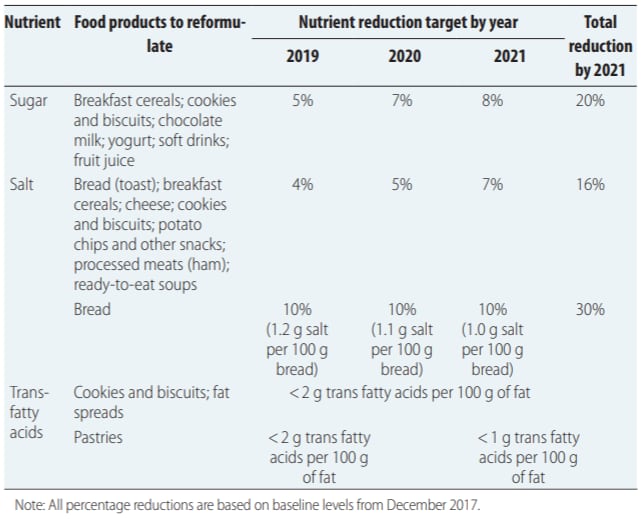Non-communicable diseases (NCDs), such as cardiovascular disease and diabetes, are responsible for a significant number of deaths in Portugal each year.
In 2017, 88% of all deaths – 96,587 out of 109,758 – were attributed to such diseases.
Dietary risk factors are the leading preventable cause of deaths attributed to NCDs in Portugal. The mean daily intake of free sugars in 2015-16, for example, stood at approximately 35g per day, according to national data. This equates to around 24% of the population, or 2,600,000, who exceed the World Health Organization (WHO)’s recommended limits for free sugar consumption.
Portugal has taken steps to reduce preventable mortality rates. Aligning with the United Nations (UN) Sustainable Development Goals (SDGs), the country has pledged to reduce premature mortality from NCDs by one-third by 2030. By 2025, Portugal aims to have reduced these deaths by one quarter.
The government has also initiated a voluntary co-regulation agreement with industry. The pact challenges food and beverage players to reduce sugar, salt and trans-fatty acids (TFAs) in certain products by 2021.
In a recent study published in the WHO Bulletin, a team of researchers in Portugal looked at the impact that these targets might have on NCD mortality rates, and where Portugal stands less than six years out from its 2025 SDG commitment.
Reformulation goals
The co-regulation pact, agreed in 2015, challenges food and beverage companies to reduce salt content by 16%, sugar content by 20%, and set a limit of 2g of TFAs per 100g of fat in margarines and shortenings in processed foods by 2021.
Portugal has since proposed additional limits regarding salt in bread and pastry. The proposal requires companies to reduce the amount of salt in bread by 30% by 2021, and limit TFAs in pastry to 1g or less per 100g of fat, by 2021.
In the study, the researchers analysed government data on dietary intake in 2015-16, and on deaths from cardiovascular disease, diabetes, chronic obstructive pulmonary disease, and cancer. Then, by using the Preventable Risk Integrated ModEL tool, they predicted the number of deaths averted if reformulation targets were met across the board.
The study authors concluded that the co-regulation agreement would have averted 798 deaths in 2016, 248 of which were premature.
High fat, salt and sugar in processed foods
The study predicts that if all reformulation targets were met:
- Salt intake would reduce from 7.6g per day to 7.1g per day;
- Total energy consumption would drop from 1911kcal per day to 1897kcal due to reduced sugar intake;
- And total energy intake due to reduced trans-fat consumption would decrease from 30.4% to 30.3%
According to the findings, most of the deaths averted would occur in those older than 75 years, and reductions in cardiovascular deaths would ‘greatly outnumber’ deaths averted from cancer or diabetes. Cardiovascular disease accounted for 692 deaths averted.
Ingredients-wise, reduction in salt intake made the biggest contribution with 610 deaths averted. Reduced sugar intake resulted in 261 deaths averted.

Interestingly, no deaths were averted due to the elimination of TFAs: the Portuguese population appears to consume too much sugar and salt – but not too many TFAs. Indeed, according to national data, TFAs made up more than 1% of the total energy intake for just 0.4% of the population, or 43,000 people.
Portugal ‘not on track’ to meet SDG pledge
Overall, the study predicts that if fully implemented, the co-regulation pact would reduce the risk of premature death from 11% in 2016 to 10.7% by 2021.
Yet as risk remained around the 11% mark between 2010 and 2016, based on current trends the researchers don’t predict this to drop significantly by 2025 and 2030.
The 248 premature deaths averted “are not sufficient to significantly alter the trends in premature mortality in Portugal or achieve the 2025 and 2030 SDG targets for reduction of premature NCD mortality”, wrote the authors.
Portugal is therefore “currently not on track” to achieve its targets on schedule, the authors continued, suggesting that fully achieving the industry reformulation targets is not likely to change this outcome: “Our modelling study suggests that the Portuguese industry co-regulation agreement will save lives. However, the overall impact on risk of premature is small.”
Source: 'Modelling impacts of food industry co-regulation on noncommunicable disease mortality, Portugal'
Bulletin of the World Health Organization
Published online: July 2019
DOI: http://dx.doi.org/10.2471/BLT.18.220566
Authors: Francisco Goiana-da-Silva, David Cruz-e-Silva, Luke Allen, Maria João Gregório, Milton Severo, Paulo Jorge Nogueira, Alexandre Morais Nunes, Pedro Graça, Carla Lopes, Marisa Miraldo, João Breda, Kremlin Wickramasinghe, Ara Darzi, Fernando Araújok and Bente Mikkelsenl





